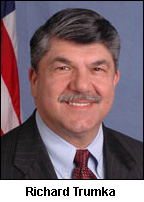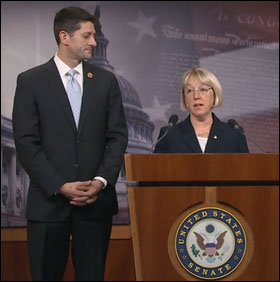NATIONAL
Budget deal brings ‘temporary relief,’ but deserts jobless
 (Dec. 11, 2013) — The following statement by AFL-CIO President Richard Trumka was released today regarding the budget deal announced Tuesday by Sen. Patty Murray (D-Wash.) and Rep. Paul Ryan (R-Wisc.):
(Dec. 11, 2013) — The following statement by AFL-CIO President Richard Trumka was released today regarding the budget deal announced Tuesday by Sen. Patty Murray (D-Wash.) and Rep. Paul Ryan (R-Wisc.):
It is shocking that Republicans have refused to include an extension of unemployment benefits in today’s budget agreement. At the end of December, federal unemployment benefits will expire for 1.3 million jobless workers. Lawmakers must not desert these workers by going home for their own holidays without extending the federal unemployment benefits program.
The budget agreement negotiated by Rep. Ryan and Sen. Murray provides temporary relief from sequestration budget cuts over the next two years, but does not represent the clean break from budget austerity that our economy so urgently needs.
We applaud Sen. Murray for resisting Republican demands to cut Social Security, Medicaid, and Medicare benefits and food assistance for people with low incomes.
Yet this budget agreement does nothing for the millions of people who remain without work and asks nothing from the people who caused our economic crisis and continue to benefit from economic inequality.
The agreement unfairly demands more sacrifice from federal employees, who had already contributed $114 billion to deficit reduction in the previous three years. By asking new federal employees to pay more out of pocket for their pensions, the agreement undermines retirement security.
The agreement further undermines retirement security by increasing the fees paid by private firms to the Pension Benefits Guaranty Corporation (PBGC), which will likely be used to justify new rounds of pension dumping by healthy companies.
Meanwhile, at the insistence of Rep. Ryan, the agreement does not demand any sacrifice from the wealthy or from Wall Street. It is hard to justify demanding further sacrifice from federal employees and private sector workers while continuing costly tax preferences for Wall Street investment managers and companies that send jobs overseas.
The urgent business before us now is fixing what’s wrong with our economy. The real problem is that unemployment is too high and wages are too low. Sequestration makes both these problems worse and needs to be repealed—not replaced with other harmful cuts. Even that will not be enough, however. We call on Congress to enact a jobs bill, invest in our future, raise the minimum wage to $10.10, and devote its full attention to restoring full employment and raising wages.
 Following is a statement about the federal budget deal from Jeff Johnson, President of the Washington State Labor Council, AFL-CIO:
Following is a statement about the federal budget deal from Jeff Johnson, President of the Washington State Labor Council, AFL-CIO:
I heard Paul Ryan crow that the budget agreement allowed them to not sacrifice any deeply held Republican principles. Well, one person’s principles are another person’s basic needs, in the case of the federal budget. Ryan and the Republican Party’s love affair with the super-rich and corporate America has them protecting every tax loophole while income inequality rages in our country.
While it is important that the negotiators eliminated a portion of the 2014-2015 sequestration, it is critical to continue fighting for an end to the austerity measures that hurt working class people, the elderly, poor and the disabled in our country. I want to thank Senator Patty Murray for protecting our earned benefit programs — Social Security, Medicare, and Medicaid — but it is just unacceptable to force more cuts on federal workers by weakening their retirement security at a time when we should be strengthening it.
Before leaving town for the holidays, Congress really needs to extend unemployment insurance benefits for the hundreds of thousands of long-term unemployed Americans who still have not recovered from the economic crisis caused by Wall Street. Then, when members of Congress are home for the holidays, I would hope that they would think long and hard about how they will come back in January and figure out ways to put America back to work.
MORE ON THE DEAL
 ► In today’s Washington Post — House. Senate negotiators reach budget deal — House and Senate negotiators unveiled an $85 billion agreement late Tuesday to fund federal agencies through the fall of 2015, averting another government shutdown and ending the cycle of crisis that has paralyzed Washington for much of the past three years. In a rare display of bipartisan cooperation, House Budget Committee Chairman Paul Ryan stood side by side in the Capitol with Senate Budget Committee Chairman Patty Murray to announce the deal, which would cancel half of the sharp spending cuts known as the sequester for the current fiscal year.
► In today’s Washington Post — House. Senate negotiators reach budget deal — House and Senate negotiators unveiled an $85 billion agreement late Tuesday to fund federal agencies through the fall of 2015, averting another government shutdown and ending the cycle of crisis that has paralyzed Washington for much of the past three years. In a rare display of bipartisan cooperation, House Budget Committee Chairman Paul Ryan stood side by side in the Capitol with Senate Budget Committee Chairman Patty Murray to announce the deal, which would cancel half of the sharp spending cuts known as the sequester for the current fiscal year.
► In today’s Washington Post — Budget deal protects current feds, while new workers will pay more toward retirement — Under the agreement reached by the Budget Conference Committee, the new workers would pay an additional 1.3 percent of salary toward retirement, saving the government $6 billion over 10 years. While federal employee unions strongly pushed against any additional payments from the workforce, the agreement is a much better deal for them than what Republicans and even President Obama had proposed.
► In today’s Washington Post — Washington is reducing the deficit but abandoning the unemployed (by Ezra Klein and Evan Soltas) — On December 28, federal jobless benefits expire for 1.3 million workers. These aren’t normal unemployment benefits. These are the extended, emergency benefits meant to help the long-term unemployed. “If there was ever time to err on the side of overextending jobless benefits, it would be now,” wrote Jim Pethokoukis at the conservative American Enterprise Institute. But the political system isn’t erring on the side of extending jobless benefits. It’s erring on the side of further deficit reduction.
► In today’s Seattle Times — Sen. Patty Murray: Budget deal will restore public trust in Congress — U.S. Sen. Patty Murray says the budget deal she and Republican Rep. Paul Ryan announced Tuesday will “restore trust that had been lost by people across the country that we could function as a Congress and as a democracy.”
► ALSO see the statement about the budget from U.S. Adam Smith: “This deal is far from perfect, but it provides relief from sequestration for critical education, housing, and transportation programs.”





